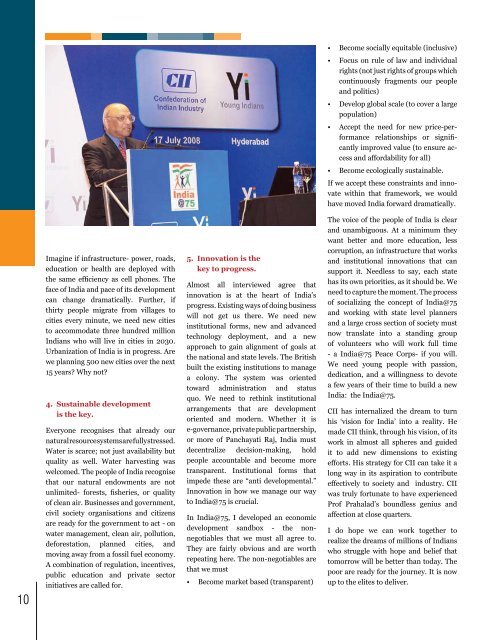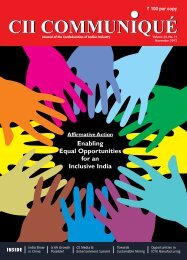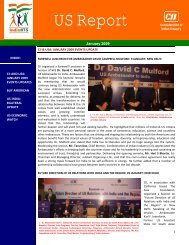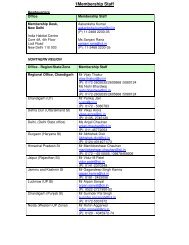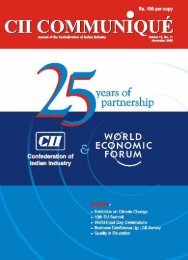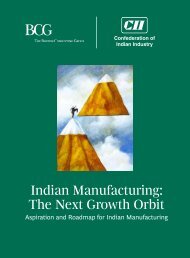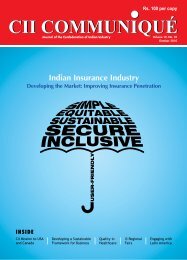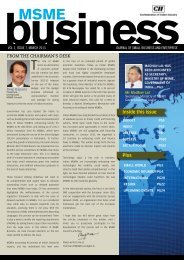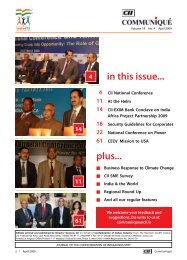Deccan Despatch (January - April 2010) - CII
Deccan Despatch (January - April 2010) - CII
Deccan Despatch (January - April 2010) - CII
You also want an ePaper? Increase the reach of your titles
YUMPU automatically turns print PDFs into web optimized ePapers that Google loves.
• Become socially equitable (inclusive)• Focus on rule of law and individualrights (not just rights of groups whichcontinuously fragments our peopleand politics)• Develop global scale (to cover a largepopulation)• Accept the need for new price-performancerelationships or significantlyimproved value (to ensure accessand affordability for all)• Become ecologically sustainable.If we accept these constraints and innovatewithin that framework, we wouldhave moved India forward dramatically.10Imagine if infrastructure- power, roads,education or health are deployed withthe same efficiency as cell phones. Theface of India and pace of its developmentcan change dramatically. Further, ifthirty people migrate from villages tocities every minute, we need new citiesto accommodate three hundred millionIndians who will live in cities in 2030.Urbanization of India is in progress. Arewe planning 500 new cities over the next15 years? Why not?4. Sustainable developmentis the key.Everyone recognises that already ournatural resource systems are fully stressed.Water is scarce; not just availability butquality as well. Water harvesting waswelcomed. The people of India recognisethat our natural endowments are notunlimited- forests, fisheries, or qualityof clean air. Businesses and government,civil society organisations and citizensare ready for the government to act - onwater management, clean air, pollution,deforestation, planned cities, andmoving away from a fossil fuel economy.A combination of regulation, incentives,public education and private sectorinitiatives are called for.5. Innovation is thekey to progress.Almost all interviewed agree thatinnovation is at the heart of India’sprogress. Existing ways of doing businesswill not get us there. We need newinstitutional forms, new and advancedtechnology deployment, and a newapproach to gain alignment of goals atthe national and state levels. The Britishbuilt the existing institutions to managea colony. The system was orientedtoward administration and statusquo. We need to rethink institutionalarrangements that are developmentoriented and modern. Whether it ise-governance, private public partnership,or more of Panchayati Raj, India mustdecentralize decision-making, holdpeople accountable and become moretransparent. Institutional forms thatimpede these are “anti developmental.”Innovation in how we manage our wayto India@75 is crucial.In India@75, I developed an economicdevelopment sandbox - the nonnegotiablesthat we must all agree to.They are fairly obvious and are worthrepeating here. The non-negotiables arethat we must• Become market based (transparent)The voice of the people of India is clearand unambiguous. At a minimum theywant better and more education, lesscorruption, an infrastructure that worksand institutional innovations that cansupport it. Needless to say, each statehas its own priorities, as it should be. Weneed to capture the moment. The processof socializing the concept of India@75and working with state level plannersand a large cross section of society mustnow translate into a standing groupof volunteers who will work full time- a India@75 Peace Corps- if you will.We need young people with passion,dedication, and a willingness to devotea few years of their time to build a newIndia: the India@75.<strong>CII</strong> has internalized the dream to turnhis ‘vision for India’ into a reality. Hemade <strong>CII</strong> think, through his vision, of itswork in almost all spheres and guidedit to add new dimensions to existingefforts. His strategy for <strong>CII</strong> can take it along way in its aspiration to contributeeffectively to society and industry. <strong>CII</strong>was truly fortunate to have experiencedProf Prahalad’s boundless genius andaffection at close quarters.I do hope we can work together torealize the dreams of millions of Indianswho struggle with hope and belief thattomorrow will be better than today. Thepoor are ready for the journey. It is nowup to the elites to deliver.


